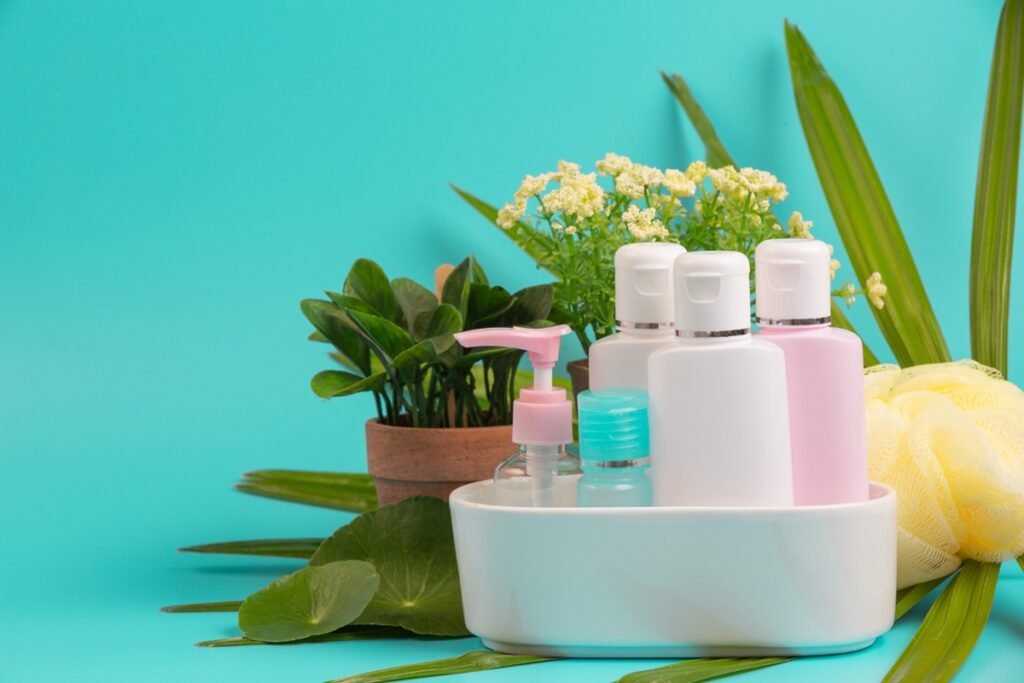Based on a study by Statista, “The Beauty & Personal Care market worldwide is projected to generate a revenue of US$677.19bn in 2025,” and that’s not just big, that’s massive. In this booming space of the market, the winners aren’t just brands with flashy ads or celebrity endorsements, they’re the ones who get real: real ingredients, real tech, and real results.
Welcome to 2025, where self-care isn’t just about what you put on your skin—it’s about what you stand for. Whether you’re a retailer curating shelves or a beauty lover looking to upgrade your routine, these trends aren’t optional anymore. They’re where the demand is heading. Fast.
Let’s dive into the top personal care FMCG products of 2025—and what’s really making them fly off the shelves.
1. Clean and Sustainable Skincare Products
Clean beauty is no longer a niche, it’s the new normal. And we have Gen Z to thank for that. They’re not just buying skincare; they’re buying into values. So, just slapping a green label on a plastic bottle doesn’t cut it anymore. Today’s consumer knows better and demands more.
Eco-Friendly and Refillable Packaging
Think refillable deodorant sticks. Shampoo bars in compostable wraps. Brands are ditching bulky plastic for recyclable glass, biodegradable tubs, and sleek refill pods. Shoppers want packaging that looks good and does good.
Brands that are doing it right: Dove’s refillable aluminum bottles. The Body Shop’s in-store refill stations. Even L’Oréal is going all in with their sustainable innovation program.
Natural, Non-Toxic Ingredients
“Plant-based” isn’t just a dietary choice anymore. Skincare powered by botanicals, fruit enzymes, and probiotic-rich ferments is everywhere. People are checking labels like nutrition facts. If it’s not clean, it’s not going in the cart.
Hot picks for GenZs: Aloe vera gel and masks. Rosehip and niacinamide serums. Products labeled “paraben-free,” “no synthetic fragrance,” and “cruelty-free.”
Ethical Sourcing
It’s not enough for a product to be good; it has to do good. Buyers are gravitating toward personal care FMCG products from brands with strong values: carbon-neutral shipping, fair trade partnerships, and zero animal testing.
Pro tip for seller: Make sustainability easy to spot. Highlight eco-credentials on your website, packaging, and point-of-sale materials. Today’s conscious consumer expects it.
2. Personalized Skincare Solutions
One-size-fits-all? That’s so 2015. In 2025, it’s all about personal formulas, based on your particular skin type and tone.
AI & Data-Driven Products
“Skincare powered by algorithms” – sounds unreal, but it is not. Think of apps that scan your face and suggest routines, or devices that analyze hydration levels, brands are already using AI to personalize products.
Made-to-order Products
Nowadays, brands are taking custom orders for your skin concerns. All you have to do is fill out a quick quiz: What’s your skin type? What are your biggest concerns? Dry cheeks, oily chin, hormonal breakouts? Then, Voila! Your serums, moisturizers, or full skincare regimens are all in the making.
It’s like having a skincare chef mix up a formula just for you.
And the best part? These aren’t boutique-only services anymore. Even big FMCG players are entering the personalized beauty game.
3. Beauty Supplements & “Beauty from Within” Products
The beauty supplement market in 2025 is growing fast, and you, as a retailer, should move faster.
Glow Pills and Collagen Shots
If you can drink it or pop it, it’s probably a trending personal care FMCG product right now. Products like:
- collagen powders in matcha,
- biotin in chewable berry gummies, or,
- hyaluronic acid in your morning coffee are all the most demanded products today.
But why these products? This is because people are waking up to the fact that skincare starts inside. Beauty isn’t just on the shelf, it can also be in the smoothie.
Holistic Wellness Skincare
Consumers today are choosing products that go beyond surface-level beauty. They want skincare that helps with stress, supports sleep, boosts gut health, and even balances hormones.
That’s why we’re seeing a rise in “beauty-meets-wellness” hybrids. These aren’t just lotions and serums anymore. Products like adaptogen-infused creams to calm the skin and nerves, or magnesium mists that help you relax before bed while giving your skin a hydration boost, are all a new self-care ritual for you.
These wellness-driven solutions are perfect for consumers who want to feel good, look good, and skip the 10-step routine. It’s self-care made simple, and people are loving the convenience.
4. High-Tech Beauty Devices & Tools
Welcome to the era of at-home beauty tech, where the gadgets are smarter, the routines are quicker, and yes, the results are showing up, literally on your skin.
At-Home Dermatology Devices
Who has time (or money) for weekly salon visits? In 2025, your room is the new beauty clinic. At-home gadgets are no longer gimmicks—they’re beauty essentials.
We’re seeing a surge in:
- LED therapy masks for acne, aging, and that celeb-level glow
- Microcurrent tools that tone your jawline while you scroll
- Ultrasonic pore cleansers that vacuum out dirt like a dream
These aren’t just pretty lights and buttons—they work. Consumers are now picking gadgets that deliver visible results in a short time.
Smart Skin Monitoring Technology
Wouldn’t it be amazing to have a mirror that tells you your skin’s moisture level, or an app that warns you when your skincare isn’t working? Well then, welcome to the era of smart skincare. Top brands like
- L’Oréal’s Perso dispenses personalized formulas based on your skin’s needs and weather.
- FOREO’s Luna range combines cleansing with gentle tech exfoliation.
- Neutrogena’s Skin360 app tracks skin progress using AI-backed insights.
So, nowadays, it’s not just about fancy tech. It’s about smarter decisions. People are tweaking routines in real-time, and tools like these are helping them waste less and glow more.
H2: Inclusive and Diverse Personal Care Items
Beauty shelves are finally catching up with the real world. People come in all shades, hair textures, skin types, and now, personal care products do too.
Formulations for All Skin and Hair Types
2025 is seeing a refreshing shift. No more five shades of beige on the shelf. We’re talking about deeper foundations, curl-friendly hair care, melanin-safe sunscreens that don’t leave you looking like a ghost, and intimate care that respects all bodies, not just the ones brands used to cater to by default.
Brands have kicked open the door with inclusive makeup. Big players like P&G and Unilever are expanding their personal care lines to include a much wider range of skin tones, hair textures, and cultural preferences. And it’s not just about being politically correct—it’s good business. When people feel seen, they buy more.
Representation and Transparency in Branding
Here’s the thing: customers can tell when a brand is faking it. Stock-photo campaigns and generic “we care” statements don’t fly anymore.
Consumers want the real deal—founders who understand their everyday experiences, products developed with real people in mind, and campaigns that reflect their stories, not just someone else’s idea of “inclusive marketing.”
What’s working in 2025, you ask? It’s Community-driven R&D. Co-creating with diverse skincare experts, using real customers in branding and not models pretending to fit the role. Because when people feel genuinely seen and heard, they don’t just buy once. They come back. They recommend. They build loyalty around a brand that actually gets them.
Wrapping It Up
2025 is the year personal care FMCG stopped being just about “beauty.” Now it’s about tech, truth, and total wellness.
From sustainable packaging to smart skincare, these aren’t trends, they’re the new standards. Whether you’re selling them, buying them, or creating them, this is your cheat sheet to staying ahead.
Want to keep winning in the personal care space? Stock smarter. Market better. And most importantly, listen to what your customers actually want.
FAQs
Q: What are the most popular personal care FMCG products in 2025?
Anything clean, smart, and sustainable—think collagen gummies, refillable skincare kits, and AI-powered beauty apps.
Q: Which beauty brands are killing it right now?
L’Oréal for tech, Dove for sustainability, and small-batch brands for personalization. Keep an eye on them.
Q: What ingredients should I look for in clean skincare?
Look for niacinamide, hyaluronic acid, rosehip oil, and probiotics. Avoid sulfates, synthetic dyes, and parabens.
Q: Are at-home devices worth it?
Yes—if you use them consistently. Start with something simple, like an LED mask or ultrasonic cleanser.
Q: How do I pick the right supplement for my skin?
Check your lifestyle and goals. Want glow? Go for collagen + vitamin C. For hair? Try biotin + zinc.



